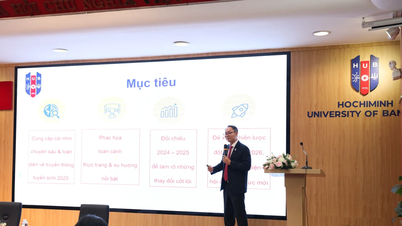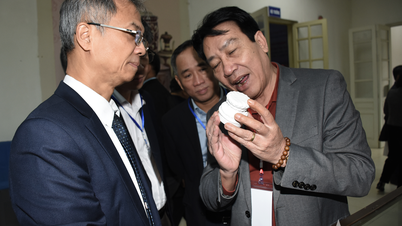
Candidates taking the 2025 high school graduation exam in Ho Chi Minh City. This year, the admission scores for many universities have increased to record levels based on high school graduation exam results - Photo: THANH HIEP
At that very moment, Resolution 71 of the Politburo called for "developing a plan to reform university admissions in a way that accurately assesses students' abilities and ensures unified control over the entrance standards of various majors and training institutions" - a clear framework for the upcoming breakthrough.
Placed within that context, the recent turmoil reveals flaws in the 30-point scale conversion system, the bonus point mechanism, and the operational capacity of the technology.
From a management perspective, it is noteworthy that the capacity for listening and the consultation mechanisms have not been operating effectively, leading to some decisions not being made in a timely manner based on scientific evidence and empirical data.
The consequences include the forced conversion of all measurement methods to a 30-point scale despite differences in measurement; the publication of "percentiles" but a lack of data transparency; the use of "competency assessment" but reliance on meaningless bonus points; and vague risk management and accountability.
The three knots in the "tangle" are now clear.
Firstly, the technically-oriented understanding of "fairness" has imposed different metrics into the same framework, distorting signals and creating a chaotic standard: with the same ability, some schools pass while others fail.
Secondly, there's the paradox of prioritization: tightening regional priority while opening up opportunities for awarding points based on academic certificates inadvertently shifts the advantage to those with more resources, while disadvantaged students lose their meager "shield."
Third, weak technological operation: a national event that takes place only once a year should have robust infrastructure and contingency plans; when technology can change the outcome of people's lives, it's no longer a systemic failure, but a governance failure.
International experience reminds us of a simple truth: stable rules and accountability coupled with autonomy. South Korea maintains the CSAT's stability but allows schools to add their own criteria; Japan separates the testing organization from government management, allowing schools to design their own criteria to ensure stratification; the US uses transparent standardized measures, which schools can use or discard but must be accountable with data. The common denominator is predictable rules, open data, and clear accountability.
In the short term, we need to professionalize the question-setting process to ensure the "dual objectives" of both graduation and university admissions: standardizing the structure and matrix, building a question bank based on a standardized scale, and conducting independent pre-validation and post-validation reviews and tests.
From that foundation, the following steps should proceed seamlessly: stabilize regulations for a minimum of five years to end the practice of "changing rules mid-stream"; if multiple methods are maintained, there must be a national reference framework based on empirical research, publishing the model - data - error, mandating pilot testing before scaling up, and updating according to a roadmap that avoids disruption.
At the school level, increase transparency by publicly disclosing the weight and effectiveness of each method, along with admission data by channel, for public oversight; in terms of technology, commission an independent admissions platform with standardized technical specifications and adhere to the principle of mandatory load testing before the exam season to reveal errors, track system activity, and open a complaint channel; identify who is responsible for any failures. Simultaneously, stop relying solely on bonus points for "leverage."
Under no circumstances should invalid foreign language certificates be added to or converted into admission scores; after enrollment, valid certificates can be used to exempt students from foreign language courses, for class placement, and/or to recognize equivalent credits, without changing the admission score.
In the long term, university admissions should become a benchmark for high school teaching and learning: it should not create unbalanced learning motivation but accurately measure the competencies that predict success in university (quantitative reasoning, academic reading and writing, scientific and IT knowledge, foreign languages).
The shift is from a fragmented point system to a standardized, verifiable proof of competence; from administrative adjustments to evidence-based design with predictive value studies tracking multiple courses; from a single exam to a standardized evidence-based combination (a national exam guaranteeing a minimum threshold combined with a subject-specific readiness assessment with clear thresholds, not a mechanical addition), along with support mechanisms to ensure opportunities for students in disadvantaged areas. And all innovations must go through pilot testing, data publication, and only be implemented when it is proven that they do not push the system towards academic imbalance.
A better competition season doesn't come from adding more terminology or more virtual filtering rounds, but from stable rules, scientific basis, transparent data, and clear accountability.
When policymakers listen and dare to experiment, measure, and correct mistakes; when schools are given autonomy and accountability; and when the interests of candidates are prioritized, the next exam season will see fewer sighs and anxieties, and more smiles.
Source: https://tuoitre.vn/de-mua-thi-sau-tot-hon-20250829084313848.htm















































































































Comment (0)